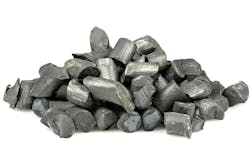So That Happened: Making Battery Materials in the US
Editor’s note: Welcome to So That Happened, our editors’ takes on things going on in the manufacturing world that deserve some extra attention. This will appear regularly in the Member’s Only section of the site.
Teamsters Strike Ends at Nestle Purina PetCare
A seven-week strike at the Nestle Purina PetCare plant in South Whitehall Township, Pennsylvania, has ended with a new contract.
More than 450 Teamsters Local 773 members ratified a four-year deal that included wage increases and an expedited grievance procedure, in addition to other workplace improvements, the union announced April 21.
Those additional workplace issues include “sizable increases to the pension and then a lot of language issues cleaned up in the contract,” Local 773 Secretary Treasurer Brian Taylor told the Morning Call.
“We believe the settlement is in the interest of both our employees and our business,” a company spokesperson added.
Nestle Purina and the union had been bargaining since Feb. 1, with the Teamsters local launching the strike in early March after the two sides were unable to reach an agreement.
The South Whitehall manufacturing plant produces a range of pet food brands, including Alpo and Friskies. Local 773 represents workers in multiple industries throughout the Lehigh Valley.
—Jill Jusko
Ford is Taking Chinese Lessons
Ford Motor Co. Vice Chairman John Lawler was clear as crystal: Automakers need to follow the Chinese path.
Speaking at the recent BofA Securities 2025 Automotive Summit, Lawler said the next generation of electric cars will need to be made according to the principles that Chinese companies have refined over the past decade. Among the most important elements of that, he added, is the need for speed.
Lawler said the pace of product development among Chinese firms—including Ford’s main partner in the market, Changan Automobile—is “unbelievable” and pointed out that some players can go from concept to being in the market in less than two years. Ford, he added, is making it a priority to learn just how that is happening and how it can apply those methods to its operations around the globe.
“We need to bring those learnings together and we need to continue to accelerate that,” he said. “Is it going to be the same cost structure? No. […] Is it 10%, is it 15%, is it 20% [higher?]? Whoever can do that at the lowest increase is going to win.”
Investors and consumers may not have long to wait to see if Ford teams have been good students. Lawler said the company’s electrification skunkworks group in California—now dubbed the Advanced Electrc Vehicle Development Center—has booked solid gains and will look to integrate some learnings from China into its products. The first of those will be a mid-sized electric pickup truck due to come to market in 2027.
“We believe that our vehicles coming off of that platform and the top hats we put on that platform will be fully competitive with the global base—so the Chinese as well as anybody else,” Lawler said.
—Geert De Lombaerde
Becoming a Talent Magnet
With the goal of helping manufacturers become sought-after career destinations, FloridaMakes, the official representative of the Manufacturing Extention Partnership National Network in Florida, has launched the Florida Manufacturer Employer of Choice Assessment.
"The days of competing on salary alone are long gone," says Rob Harris, executive director for Sarasota-Manatee Area Manufacturers Association and Southwest Regional Manufacturers Association. "The manufacturing companies that dominate their markets are those creating environments where skilled professionals can thrive personally and professionally. This assessment is the blueprint for building that magnetic workplace."
The assessment program provides manufacturers with insights into their workplace environment, benchmarking their operations against six key areas:
- Recruitment
- Employee development
- Compensation and benefits
- Financial wellness
- Workplace culture
- Employee engagement
"Our assessment doesn't just identify gaps—it provides manufacturers with the actionable intelligence they need to transform their workplace into a talent attraction powerhouse,” says FloridaMakes Director of Workforce Development Marcelo Dossantos.
—Anna Smith
Chobani Announces New Yogurt Factory
Chobani announced yesterday it would spend $1.2 billion on a new dairy processing plant in Rome, New York. The yogurt giant said its new plant, due east of Syracuse, would employ 1,000 people. Once the plant is up and running, it will use 28 production lines to process 12 million pounds of milk per day. Assuming whole milk, this editor estimates that’s about 1.4 million gallons.
According to Chobani, this milk will come from local producers in the Mohawk Valley of New York State, and the new plant will bring total milk purchases there to approximately 6 billion pounds per year.
Chobani CEO Hamdi Ulukaya noted that New York is the state where Chobani started: Its original home, he said, was South Edmeston. New York Governor Kathy Hochul called the Chobani investment “the largest natural food manufacturing investment in American history” and said it would help revitalize the manufacturing sector in upstate New York.
The Rome investment adds on to existing Chobani investment announcements of a $500 expansion in its Twin Falls, Idaho plant, announced last month.
—Ryan Secard
Building a US Pipeline for Battery Materials
With all of the recent talk about reshoring production to the United States, many companies have complained about not being able to find local suppliers, especially in certain high-tech industries dominated by companies from China.
Thanks to more than a decade of state-sponsored investments, China controls much of the market for powerful batteries needed for electric vehicles, starting with the raw materials needed to produce them. Between high tariffs on imported goods, national security concerns over dependence on foreign-made materials and investments from reshoring initiatives, several companies have announced new projects to bring some of that material production to the U.S. in the near future.
-
Pure Lithium Corp. Secures Funding from Export-Import Bank
The federally backed Export-Import Bank of the United States (EXIM), plans to loan $300 million to Boston, Massachusetts-based Pure Lithium to develop an industrial-scale lithium metal vanadium battery manufacturing facility through the bank’s Make More in America initiative.
Pure Lithium Founder and CEO Emilie Bodoin said, “Our disruptive brine-to-battery technology will enable the creation of the first complete U.S.-based battery supply chain, from sourcing the materials to producing the finished product.”
Still in the experimental phase, Pure Lithium says its lithium-vanadium battery outperforms the lithium-ion batteries used in most of today’s electric cars while eliminating the need for graphite, cobalt, nickel and manganese – hard-to-secure or expensive materials that drive up battery pricing.
-
Western CAM Begins Lithium Phosphate Materials Production
While lithium-ion batteries offer higher capacity, Ford, Tesla and other automakers have begun offering lithium-phosphate batteries during the past few years. Phosphate-based systems are cheaper-to-produce, faster to recharge and less prone to overheating. In addition to electric cars, the batteries are being used for large-scale energy storage projects and other industrial systems.
Western CAM (cathode active materials) produces materials used in battery cathodes for lithium-ion batteries now and has started production on lithium-phosphate systems thanks to a letter of intent from a high-volume battery producer. Early samples will be completed during the first half of this year with plans to scale up to high-volume production following that.
“We’re not just re-shoring the most important battery materials of this decade and the next — materials originally developed here in the U.S. — we’re reshaping the future of American energy independence,” said Isobel Sheldon, CEO and co-founder of Western CAM. “This isn’t about waiting for next-generation breakthroughs. We’re focused on executing the hard part — making proven chemistries manufacturable, affordable and American.”
-
Rare Earth Elements Recycling Coming to Arizona
Toronto, Ontario, Canada-based Cyclic Materials is spending more than $20 million on a materials recycling facility on Mesa, Arizona, for rare-earth elements (REEs). Rare earths aren’t exactly rare – but producers must process massive amounts of dirt to separate and refine tiny amounts of them.
The materials are critical for permanent magnets used in electric motors for vehicles and countless pieces of industrial equipment.
Cyclic says the Arizona plant will be the company’s first recycling operation focused on the separation of permanent magnets from end-of-life products previously not recovered.
As part of the company’s commitment to building a sustainable ecosystem, Cyclic Materials is establishing a feedstock supply network that will serve the entire U.S. It has partnerships in the Southwest—a key region with an estimated 155,000 metric tons per year of end-of-life components from automotive and e-scrap metals.
Cyclic Materials CEO and Co-Founder Ahmad Ghahreman said that the Mesa plant “will support our mission to address the global supply-demand imbalance for rare earth materials. By developing circular supply chains, we can reduce dependence on overseas sources and secure a more stable REE supply for the future.”
Founded in 2021, the Canadian startup has financial backing from Microsoft, Hitachi Ventures and BMW iVentures
-
Cobalt Refinement Technology, Production System Could Create U.S. Supply Base
Xerion Advanced Battery Corp., an Ohio-based technology company, has developed a system for refining cobalt into battery materials by combining it with lithium, manganese and nickel in molten salts, slashing carbon emissions in the materials process and cutting out several costly steps.
The company announced today that it has begun full-scale testing of the process at its pilot plant in Dayton.
"Our technology is not just an incremental improvement – it's a fundamental reimagining of how we produce critical minerals," said Dr. John Busbee, CEO and co-founder of Xerion. "We are passionate about the advancement of a domestic battery materials supply chain, and we are proud to be addressing a critical national security challenge by presenting a solution that can significantly reduce our dependence on foreign mineral supplies.”
The U.S. currently has no cobalt refinement capacity, while China is responsible for 72% of global refinement capacity, according to the International Energy Agency (IEA).
—Robert Schoenberger
About the Author
Jill Jusko
Bio: Jill Jusko is executive editor for IndustryWeek. She has been writing about manufacturing operations leadership for more than 20 years. Her coverage spotlights companies that are in pursuit of world-class results in quality, productivity, cost and other benchmarks by implementing the latest continuous improvement and lean/Six-Sigma strategies. Jill also coordinates IndustryWeek’s Best Plants Awards Program, which annually salutes the leading manufacturing facilities in North America.
Have a story idea? Send it to [email protected].
Geert De Lombaerde
Senior Editor
A native of Belgium, Geert De Lombaerde has been in business journalism since the mid-1990s and writes about public companies, markets and economic trends for Endeavor Business Media publications, focusing on IndustryWeek, FleetOwner, Oil & Gas Journal, T&D World and Healthcare Innovation. He also curates the twice-monthly Market Moves Strategy newsletter that showcases Endeavor stories on strategy, leadership and investment and contributes to other Market Moves newsletters.
With a degree in journalism from the University of Missouri, he began his reporting career at the Business Courier in Cincinnati in 1997, initially covering retail and the courts before shifting to banking, insurance and investing. He later was managing editor and editor of the Nashville Business Journal before being named editor of the Nashville Post in early 2008. He led a team that helped grow the Post's online traffic more than fivefold before joining Endeavor in September 2021.
Anna Smith
News Editor
News Editor
LinkedIn: https://www.linkedin.com/in/anna-m-smith/
Bio: Anna Smith joined IndustryWeek in 2021. She handles IW’s daily newsletters and breaking news of interest to the manufacturing industry. Anna was previously an editorial assistant at New Equipment Digest, Material Handling & Logistics and other publications.
Ryan Secard
Associate Editor
Ryan Secard joined Endeavor B2B in 2020 as a news editor for IndustryWeek. He currently contributes to IW, American Machinist, Foundry Management & Technology, and Plant Services on breaking manufacturing news, new products, plant openings and closures, and labor issues in manufacturing.
Robert Schoenberger
Editor-in-Chief
LinkedIn: linkedin.com/in/robert-schoenberger-4326b810
Bio: Robert Schoenberger has been writing about manufacturing technology in one form or another since the late 1990s. He began his career in newspapers in South Texas and has worked for The Clarion-Ledger in Jackson, Mississippi; The Courier-Journal in Louisville, Kentucky; and The Plain Dealer in Cleveland where he spent more than six years as the automotive reporter. In 2014, he launched Today's Motor Vehicles (now EV Manufacturing & Design), a magazine focusing on design and manufacturing topics within the automotive and commercial truck worlds. He joined IndustryWeek in late 2021.



